Complete Solutions to PHYSICS of chapter JEE MOCK TEST 18 of Class 12 book with complete answers and questions
| Class 12 | PHYSICS |
| Chapter | JEE MOCK TEST 18 |
| NTA MOCK TEST | PHYSICS |
| Number Of Questions | 25 |
| Academic Year | 2023-24 |
n moles of an ideal gas undergoes a process `AtoB` as shown in the figure. The maximum temperature of the gas during the process will be:
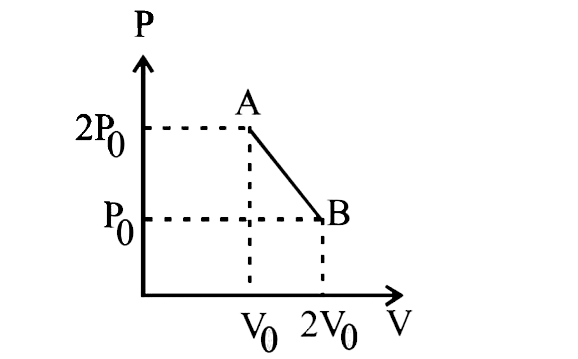
View SolutionA door 1.6 m wide requires a force of 1 N to be applied at the free and to open or close it. The force that is required at a point 0.4 m distant from the hinges for opening or closing the door is
View SolutionA second pendulum is moved to moon where acceleration due to gravity is 1/6 times that of the earth, the length of the second pendulum on moon would be
View SolutionFor a transistor the current amplification factor is `0.8` The transistor is connected in common emitter configuration, the change in collector current when the base current changes by `6mA` is
View SolutionA magnetic dipole is acted upon by two magnetic fields with inclined to each other at an angle of `75^(@)`. One of the fields has a magnitude of 15 mT. The dipole attains stable equilibrium at an angle of `30^(@)` with this field. The magnitude of the other field (in mT) is close to
View SolutionAn ideal gas is expanding such that `PT^(2)= `constant. The coefficient of volume expansion of the gas is:
View SolutionA student is performing the experiment of resonance column. The diameter of the column tube is `4 cm`. The frequency of the tuning fork is `512 Hz` The air temperature is `38.^(@) C` in which the speed of sound is `336 m//s`. The zero of the meter scale coincides with the top end of the resonance column tube. When the first resonance occurs, the reading of the water level in the column is.
View SolutionIn a Young's double slit experiment, 12 fringes are observed to be formed in a certain segment of the screen when light of wavelength `600nm` is used. If the wavelength of light is changed to `400nm`, number of fringes observed in the same segment of the screen is given by
View SolutionA wire of length l has a resistance R. If half of the length is stretched to make the radius half of its original value, then the final resistance of the wire is
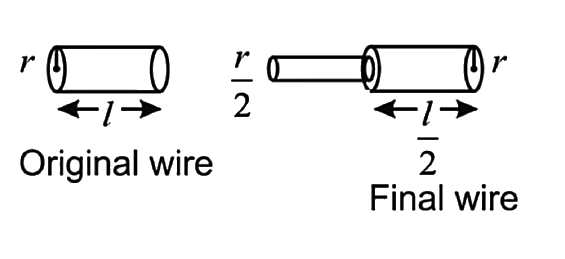
View SolutionFind the `Q` value of the reaction `P + .^(7) Li rarr .^(4) He +.^(4) He`. Determine whether the reaction is exothermic or endothermic. The atomic masses of `.^(1) H,.^(4) He` and `.^(7)Li` are `1.007825 u,4.002603 u`, and `7.016004 u`, respectively.
View SolutionA wheel having mass m has charges `+q` and `-q` on diametrically opposite points. It remains in equilibrium on a rough inclined plane in the presence of a uniform vertical electric field E. The value of E is
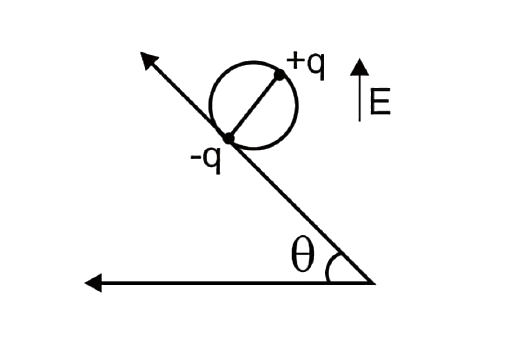
View SolutionIf the following atoms and molecules for the transition from `n = 2` to `n = 1`, the spectral line of minimum wavelength will be produced by
View SolutionThe `beta-` activity of a sample of `CO_(2)` prepared form a contemporary wood gave a count rate of `25.5` counts per minute `(cp m)`. The same of `CO_(2)` form an ancient wooden statue gave a count rate of `20.5 cp m`, in the same counter condition. Calculate its age to the nearest 50 year taking `t_(1//2)` for `.^(14)C` as 5770 year. What would be the expected count rate of an identical mass of `CO_(2)` form a sample which is 4000 year old?
View SolutionThe gravitational field in a region is given by `vecg=(5hati+12hatj)"N kg"^(-1)`. The change in the gravitational potential energy of a particle of mass 2kg when it is taken from the origin to a point `(7m, -3m)` is
View SolutionTime taken by the particle to reach from `A` to `B` is `t`. Then the distance `AB` is equal to
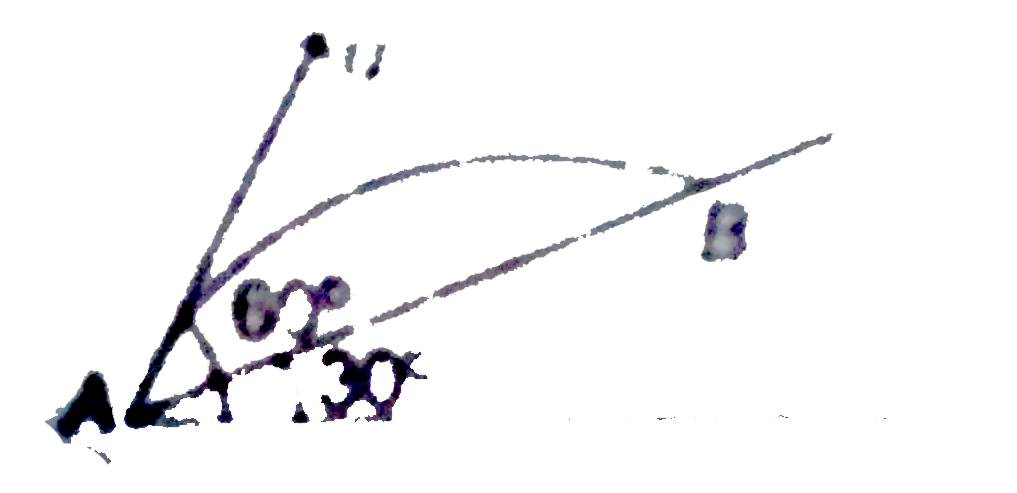
View SolutionTwo particles of charges `+Q` and `-Q` are projected from the same point with a velocity v in a region of unifrom magnetic filed `B` such that the velocity vector makes an angle `theta` with the magnetic filed Their masses are `M` and `2M` respectively Then, they will meet again for the first time at a point whose distane from the point of projection is .
View SolutionIn the adjacent circuit, the instantaneous current equation is
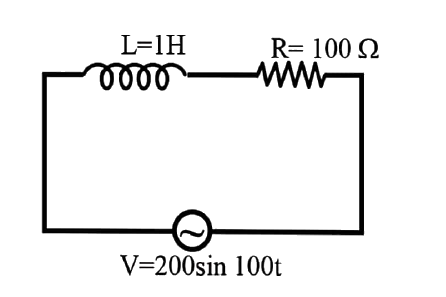
View SolutionOxygen gas is made to undergo a process in which its molar heat capacity `C` depends on its absolute temperature `T` as `C = alpha T`. Work done by it when heated from an initial temperature `T_(0)` to a final temperature `2 T_(0)`, will be
View SolutionA glass capillary tube is of the shape of a truncated cone with an apex angle `alpha` so that its two ends have cross sections of different radii. When dipped in water vertically, water rises in it to a high h, where the radius of its cross section is b. If the surface tension of water is S, its density if `rho`, and its contact angle with glass is `theta`, the value of h will be (g is the acceleration due to gravity)
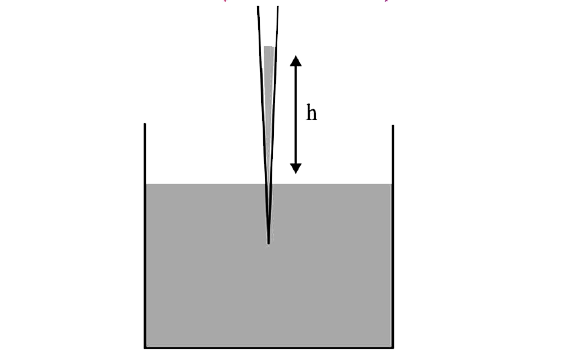
View SolutionTwo electric lamps A and B radiate the same power. Their filaments have the same diemensions, and have emissivities. `e_(A)` and `e_(B)`. Their surface tempratures are `T_(A)` an `T_(B)`. The ratio `T_(A)//T_(B)` will be equal to
View SolutionA battery of internal resistance `4Omega` is connected to the network of resistance as shown . In order that the maximum power can be delivered to the network, the value of R in `Omega` should be
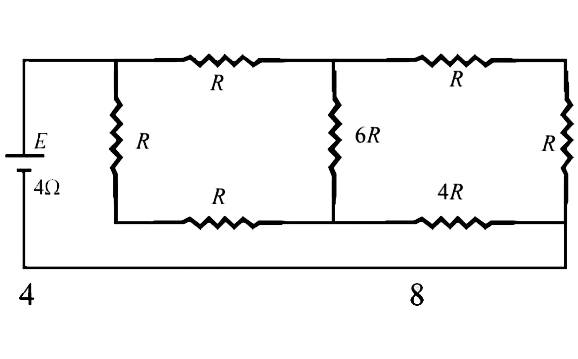 .
.
View SolutionA particular force (F) applied on a wire increases its length by `2 xx 10^(-3)` m. To increases the wire's length by `4 xx 10^(-3)` m, the applied force will be
View SolutionA rock is `1.5 xx 10^(9)` years old. The rock contains `.^(238)U` which disintegretes to form `.^(236)U`. Assume that there was no `.^(206)Pb` in the rock initially and it is the only stable product fromed by the decay. Calculate the ratio of number of nuclei of `.^(238)U` to that of `.^(206)Pb` in the rock. Half-life of `.^(238)U` is `4.5 xx 10^(9). years. `(2^(1//3)=1.259)` .
View SolutionA projectile of mass 1.2 kg undergoes a perfectly inelastic collision with a trolley of mass 3.6 kg as shown in the figure. At the time of the collision, the second of the projectile is `5ms^(-1)` at an angle of `37^(@)` with the horizontal. The trolley is free to move, only along a horizontal rail which coincides with the direction of the projectile's horizontal motion. Assuming that the trolley doesn't topple, calculate the amount of heat energy (in J) released in the collision.
`["Take "sin 37^(@)=3//5 and cos 37^(@)=4//5]`
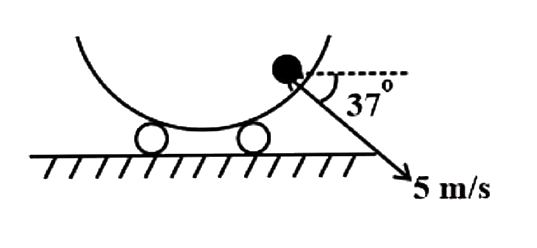
View SolutionTwo blocks A and B of masses 3 kg and 6 kg are connected by a massless spring of force constant `"1800 N m"^(-1)` and then they are placed on a smooth horizontal surface. The blocks are pulled apart to stretch the spring by 5 cm and then released. What is the relative velocity (in `ms^(-1)`) of the blocks when the spring comes to its natural length?
View Solution
PHYSICS questions and complete solutions for chapter JEE MOCK TEST 18 of NTA MOCK TESTS of Class 12